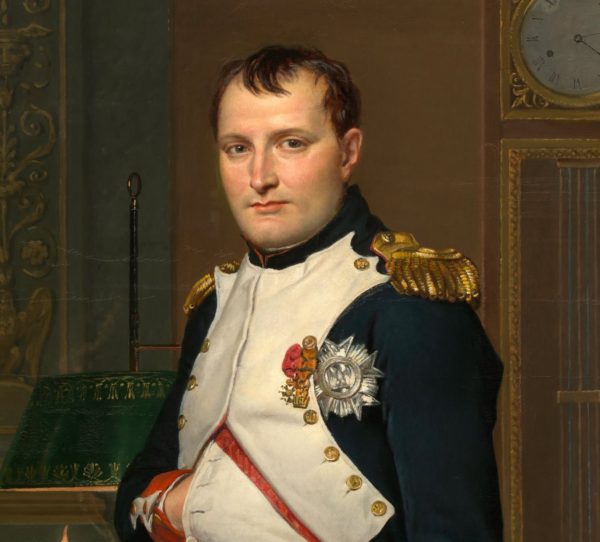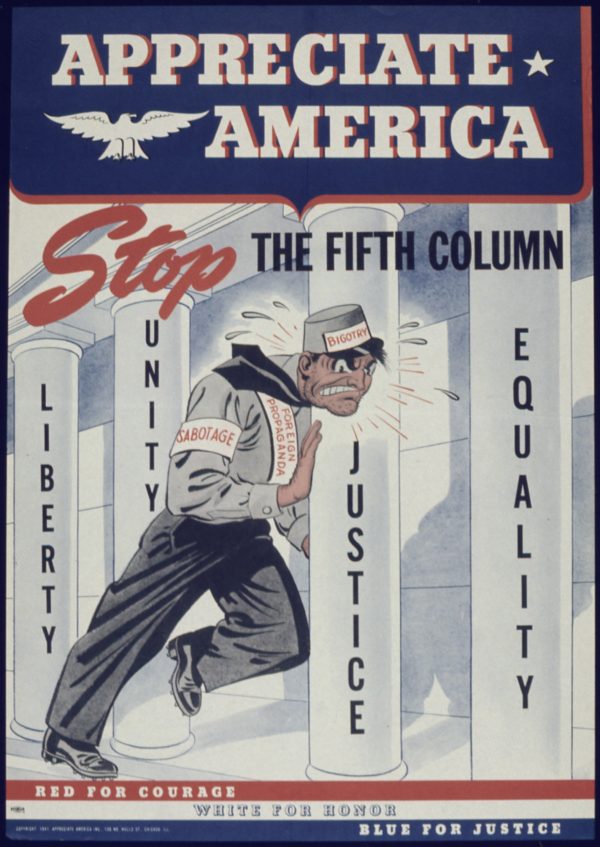How The French Revolution Created The Proposition Nation That Created Globalization
Our leaders tell us that America is a proposition nation, or one formed of political and economic bonds but not ethnic ones, as revealed by this George W. Bush speech made from late in his presidency:
America has never been united by blood or birth or soil. We are bound by ideals that move us beyond our backgrounds, lift us above our interests and teach us what it means to be citizens. Every child must be taught these principles. Every citizen must uphold them; and every immigrant, by embracing these ideals, makes our country more, not less, American.
In postwar America and Europe, the proposition nation was a principle accepted as fact. It seemed the ultimate extension of the democratic ideal: all people are equal, and therefore, it does not matter which people you have in a nation, so long as you have indoctrinated them with the right political and economic ideals. This was contrary to the founding ideas of these nations:
It’s a cliché of contemporary debate that America is a unique “Proposition Nation,†not one of those nasty ethnically-specific nation-states in Europe. Anyone can become an American by subscribing to a set of abstract principles, etc. etc. Quack quack.
In Alien Nation, I pointed out that this would have been news to the Founders, and indeed to pretty well all Americans before World War II. They were highly conscious of America`s specific ethnic and cultural heritage, i.e. national identity. And they thought it was very important—the reason, Jay said in The Federalist Papers, why the experiment of federal government could be made to work at all.
I also pointed out that, in fact, many European intellectuals had similar delusions of “Universal Nationâ€-hood. The most obvious example: France, where assimilating Africans and Arabs to French “culture†was actually official policy for a while. And not without some misleading signs of success, as in the American case.
When looking for the origin of an idea, it makes sense to go back to its earliest incarnation, which can be found in the idea of Leftism, or equality, itself. This is one of those notions that is so close to a basic human pathology, which is the desire to mandate inclusion of all so the individual cannot be excluded from the group, that it probably does not have a single source, but as with a fatal disease, is normally kept in check but gains strength in moribund patients.
This decay found its voice however in the French Revolution which, owing to the evangelical nature of Leftism, quickly became a war for control of Europe that would define the next two centuries. As observed by academics, the need of Leftism to expand created a type of “internationalism” that was the fore-runner of ideas such as diversity and globalism today:
In France, war initially encouraged national solidarity as the entire country mobilized. As the war persisted this solidarity broke down and a chasm developed between civilians and soldiers. The latter were increasingly motivated by a cult of honour that found its ultimate expression in Napoleon Bonaparte. He seized control of France in 1799, and then built up an empire in which the national element was increasingly diluted with each new conquest. Napoleonic imperialism in turn triggered reactions in other parts of Europe where opposition to French exploitation manifested itself amongst ordinary people. Intellectuals and some politicians sought to harness popular sentiment by preaching national hatred, and to some extent this assisted the massive mobilization effort necessary to defeat Napoleon.
The historian Julius Brauthal, in his 1967 epic History of the International (Vol. 2) noted that internationalism was a value of the French Revolution and that was the origin of its modern form. The Leftist form of internationalism consists of the idea that national borders can be erased by ideology through the cooperation of Leftists worldwide to advance a world order based on Leftism, not realism:
Liberal internationalism, cluster of ideas derived from the belief that international progress is possible, where progress is defined as movement toward increasing levels of harmonious cooperation between political communities.
Liberal internationalist theories address how best to organize and reform the international system. In general, liberal internationalists regard violence as the policy of last resort, advocate diplomacy and multilateralism as the most-appropriate strategies for states to pursue, and tend to champion supranational political structures (such as the European Union) and international organizations (especially the United Nations).
Liberal internationalism is typically contrasted with realism, and during the final decades of the 20th century the academic field of international relations came to be characterized as a clash between variants of those two traditions. Realists accuse internationalists of being naive and even dangerously utopian, and internationalists accuse realists of being overly fatalistic.
Internationalism takes the basic form of the idea that natural order is bad, and must be “corrected” by human intent, which consists of the idea that all people are equal; this arises whenever societies succeed because they lose a sense of shared purpose, which previously had existed through the need to succeed. At that point, civilization becomes more complex and requires new direction, but usually moneyed interests and peasant revolts have weakened the aristocracy to the point where they no longer have the unadulterated power required to set it on a new course.
In the case of Europe, this was compounded by two factors: first, many nations in Europe became successful at roughly the same time; second, their successes resulted in population booms which seemed at first like an appropriate way to rebuild after the losses to Mongol wars and plagues only a few centuries before. In this way, Europe entered an arms race where each population expanded in order to become powerful.
By the time of the French Revolution, Europe was already flirting with proto-Leftism as a way to keep its people together. First, the royal houses had been weakened by their dependency on moneyed interests to keep up with military expenditures, and second, the expanding population created a necessity for new ways to motivate people to work together as people increasingly took civilization for granted and wanted more personal power. When The Enlightenment™ came about, intellectuals granted this new rising herd a cerebral justification through the belief in human reason which was found equally and universally in all people.
The French Revolution left France a ruined nation. The food crisis which precipitated it but was not its cause could not have been resolved, and after that Revolution, was made worse by disorder and increasing mobility to those needed for harvests. To avoid the political destabilization of the crisis, France mobilized toward war, leading to a series of Napoleonic Wars where the new Leftist state attempted to dominate Europe, which in turn provoked the other European nations into forming defensive alliances.
These alliances in turn became a means of political competition, and so, after the Leftist revolutions of the preceding century, by the time of the First World War, Europe was dangerously unstable and in the hands of weak democratic leadership which refused to address politically sensitive policy time bombs which then detonated in that devastating war. After WWI, Leftist leadership was strengthened by the near-destruction of Germany and its defense of more traditional forms of society and values.
This led to a re-formalization of internationalism in a new form which became the modern proposition nation. As Theodore Roosevelt wrote, expanding on some of the concepts of Woodrow Wilson, the new order was based on political and economic obedience rather than national origin:
There can be no sagging back in the fight for Americanism, merely because the war is over. There are plenty of persons who have already made the assertion that they believe the American people have a short memory and that they intend to revive all the foreign associations which most directly interfere with the complete Americanization of our people.
Our principle in this matter should be absolutely simple. In the first place, we should insist that if the immigrant who comes here in good faith becomes an American and assimilates himself to us, he shall be treated on an exact equality with everyone else, for it is an outrage to discriminate against any such man because of creed, or birthplace, or origin.
But this is predicated upon the person’s becoming in every facet an American, and nothing but an American. If he tries to keep segregated with men of his own origin and separated from the rest of America, then he isn’t doing his part as an American.
There can be no divided allegiance here. Any man who says he is an American, but something else also, isn’t an American at all. We have room for but one flag, the American flag, and this excludes the red flag, which symbolizes all wars against liberty and civilization, just as much as it excludes any foreign flag of a nation to which we are hostile.
We have room for but one language here, and that is the English language, for we intend to see that the crucible turns our people out as Americans, of American nationality, and not as dwellers in a polyglot boarding house; and we have room for but one sole loyalty and that is a loyalty to the American people.
In this, we see the origin of the confusion that became modern conservatism: defending the political principles of the old, but doing so by accepting the Leftist concept of world order by converting conservative methods into goals. For conservatives, the purpose was to retain all that has made civilization excellent since the dawn of time, and ideas like “liberty” and “freedom” were methods to that end. With the rise of Leftist concepts, the original goal had to be displaced, and replaced by Leftist ideas grafted on to conservative methods.
This process of “Americanization” lives on through globalism and the proposition nation. Globalism believes that since people are presumed equal, they can be indoctrinated with the American democratic ideals and will then recreate the success of America worldwide; the proposition nation consists of destroying national heritage through assembling people into political groups, echoing the sentiments of liberal internationalism.
As it turned out, Roosevelt was wrong about the nature of America, which was designed by its founders to be a Western European nation, which was made explicit through legislation passed in the same year as the Bill of Rights:
This article of legislation allowed an individual to apply for citizenship if they were a free white person, being of good character, and living in the United States for two years.
At that time, the term “white” applied exclusively to those of Western European heritage, excluding those from Eastern and Southern Europe, including the Iberian offshoot population in Ireland.
The idea that being a citizen of a European-descended nation is a political construct and not a racial one is one of the core beliefs of the cordycepted cucks who currently rule the Republican party, and descends from the Leftist idea of equality and a worldwide union of workers.
It reveals the primary reason for conservative failure, which is that they have adopted the fundamental assumptions of the Left, and therefore have no resistance to intensification of those beliefs, which leads to a gradual Leftward shift as we have seen during the era since Roosevelt made his speech.
The only way to resist this is to explicitly reject the proposition nation and the internationalist — or “globalist” — ideas behind it, mainly by affirming nationalism. With nationalism, civilization is a racial and ethnic construct, and instead of government, each society uses its cultural values enforced by citizens on each other to maintain order.
This alone refutes the delusional ideas of The Enlightenment™ and the French Revolution that have divided Western Europeans for centuries and turned us against each other through a series of futile, fratricidal wars.
Tags: french revolution, Globalism, internationalism, julius blauthal, nationalism, proposition nation, theodore roosevelt











